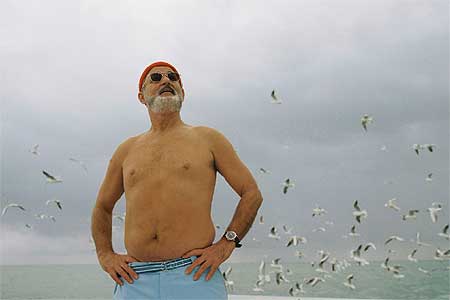When I first thought of this thesis I was really excited. It sort of made sense in my mind, but in that way that is totally unverifiable and yet still fun to throw out at parties. But after looking at the IMDB pages for a second I realized there were a few major problems with this.
I thought this argument could be made based on the idea that both filmmakers spoke to a young audience about growing up and how complicated life could be. I thought that both made trans generational films with unique and unheard of stars. Also the word "soundtracks" was rattling around my mind. But after some thoughts I developed an argument setting the two apart from one another without looking at "who is better."Firstly, Hughes' body of work stretches back three decades and consists mostly of writing credits. Anderson doesn't have nearly that scope of work yet, and this pace may never catch Hughes, but for the sake of argument lets just take the first three movies Anderson directed and wrote and the first three Hughes did.
Anderson
"Bottle Rocket"
"Rushmore"
"Royal Tenenbaums"
Hughes
"Sixteen candles"
"The Breakfast Club"
"Weird Science"
Hughes' first three are classics, but I would say a lot of that comes from the fact they have been out for a while. More to the point, I would say that his three are far more popular than Anderson's first three efforts and will always be. Yes, all six movies deal with growing up and are sort of "point in time movies," but Hughes makes movies that are trans generational and enduring. That isn't to say that Anderson's films aren't enduring (and will continue to build in that trait over time) but it does say that Huges' films mean a lot to a lot of people from all ages. Anderson's films mean a lot to a certain group of now 20 somethings who really really appreciate film and have a strange sense of humor. Simply, Hughes makes movies we can all relate to easily. Anderson makes movies a select group can relate to easily.
Casting also plays a part in this argument. Both directors have been blessed with great actors in these three movies and in most of their careers. Anderson had the revival of Bill and Hughes brought us John, but I would argue that Anderson consistently takes the familiar star and moves him into his eccentric world. Hughes on the other hand could be more credited with bringing us "stars" that are more known for pop culture references than anything else. Of course this sort of marginalizes Jason Schwartzman's presence as someone who I really think owes a lot of his career to being a pop culture reference.

In any case I think the other argument that separates the two is Hughes' impressive partnerships. I use that term loosely, but point to his work on films like the "Vacation" series "Planes, Trains and Automobiles." Both examples are once again popular classics that I think most American's could speak to in basic terms. Anderson's collaborations, to my knowledge, are limited to Noah Baumbach, who is no slouch himself, but falls into the same category of specific people liking and supporting his films. Once again we have the wide audience and the narrow but vocal minority.

I would love to hear some arguments about scene construction and style, but in short I don't see too many similarities other than careful and unique writing that creates very memorable scenes. Of course that in its self is sort of enough to show the two are very closely related and kill my thesis, so lets wrap this up. Both filmmakers have unique visions are gifted writers, but I would argue as it stands now, Hughes has a greater body of work with significantly more public awareness. I'm not really sure Anderson's films will ever be the "this is what its like to be this age in this decade" films that Hughes is known for and that's probably a good thing. After all, the world is a better place for having both of them. Anderson's "Moonrise Kingdoom" will be released in 2012: Josh Rhoten was born in California and raised in Colorado. He is a reporter at the Wyoming Tribune Eagle in Cheyenne, Wyo. His life goal is to meet the local dog catcher and/or the emperor of China.
